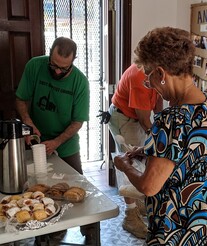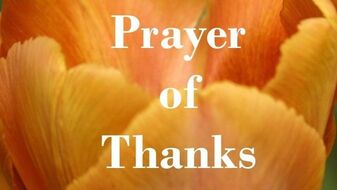 Since June I’ve been working with a congregation that is searching for a new pastor. It’s been an honor and a joy to travel alongside them this summer. By the time I arrived, members of this community of faith already were making their way through this time of pastoral transition, as well as through the unknown territory of being the church during a global pandemic. Given all of that, it would be easy for them to want to cling to how things have always been. No one would really blame them. I’m guessing many of us can relate to that longing. So much has changed and continues to change around us that returning to how things have always been would be comforting. So much has been and continues to be uncertain that returning to any sense of normal would be reassuring.
0 Comments
Gracious God, thank you for goals and dreams—both old and new—and how they can change as we travel through life. Thanks for:
Gracious God, thank you for opportunities to look back at our lives and reflect on the things about which we can feel proud. We’re grateful as we recall:
 Life is uncertain. If we didn’t know that six months ago, most of us now are certain about that uncertainty. We live more by probability than certainty. We’ll probably wake up tomorrow morning. We’ll probably still have our job. Our children probably will be healthy. But we know that probabilities can—and do—fail, so we’re left feeling uncertain. And that uncertainty makes life messy. Unexpected things go wrong. Our careful plans fall apart. Bad things happen to good people. We want guarantees, but what we get is uncertainty. All too often we have trouble dealing constructively with that uncertainty. We try to avoid its harsh reality by what one writer describes as “negative coping strategies,” such as:
But what else can we do? How might we approach uncertainty as we attempt to redefine our reality? Gracious God, thank you for the days, the moments, the seasons that stand out in our memories as the best times in our lives. Thanks for:
 “Bring what you have.” I wonder how many times I’ve read those words from Matthew’s version of the feeding of the multitude story. Regardless of the number of times, it was only recently that the words finally jumped out at me. Maybe they struck home because I can identify with Jesus’ earliest disciples. When faced with the daunting task of feeding a hungry mass of people, they felt they had nothing to offer. In face of the overwhelming needs that seem to fill our world today, I often feel the same way. I don’t have the right words to say. I’m out of time and resources. I don’t have any physical or emotional energy left. I doubt I’m alone when it comes to feeling I have nothing to offer—or that the little I might have could never be enough. But then Jesus’ words speak in a new way: “Bring what you have to me.” Gracious God, in the face of the challenges and problems and pain that seem to fill our world, we give thanks for the things that make us happy, that bring us joy, that give us satisfaction. Thank you for:
 Even before COVID-19, nearly fifty percent of Americans said they experienced loneliness. The social isolation that has been part of our lives more recently has increased that number. Loneliness can have a major impact on our mental and physical health. It can add to depression, anxiety, and stress and interfere with our ability to get a good night’s sleep. Studies show that it puts us at a higher risk for health complications such as heart disease and stroke. Often we’re embarrassed to admit our loneliness. We feel as though we should have better control of our emotions. We also worry that feeling lonely means we don’t have the meaningful relationships that other people have. I think it’s interesting that yesterday’s gospel reading began in a lonely place. Jesus had been rejected in his home town of Nazareth. He’d also just heard that John, his spiritual mentor, has been killed because of a political figure’s jealousy and foolish promise. So he goes away by himself to a lonely place. If we’re honest, many of us can relate to Jesus’ reaction. We hear about the pandemic’s growing death count, and we go a lonely place. We hear about escalating violence in our cities and around the world, and we’re taken to a desolate place. We hear about the political gridlock that continues to cripple our federal government, and we’re off to a lonely place. Gracious God, thank you for the people who have influenced our lives:
|
Kathryn PalenAssociate Executive Minister Archives
January 2023
Categories |





 RSS Feed
RSS Feed